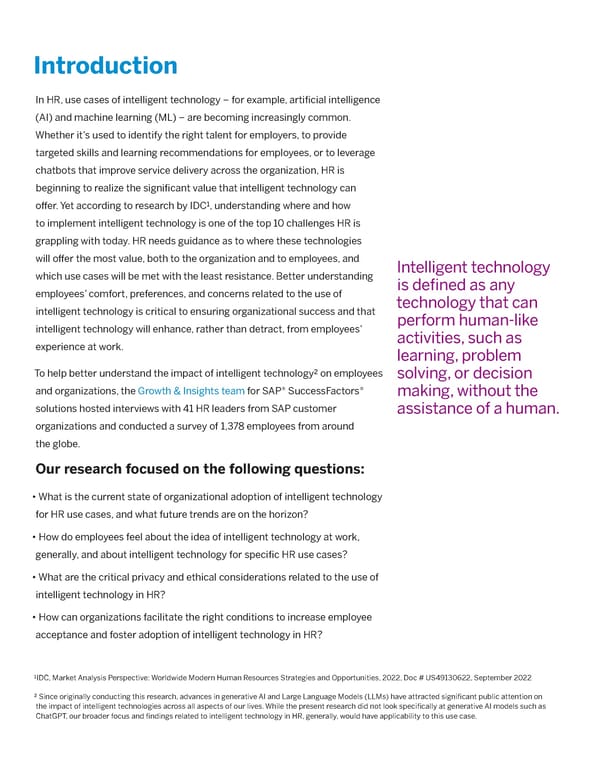Introduction In HR, use cases of intelligent technology – for example, arti昀椀cial intelligence (AI) and machine learning (ML) – are becoming increasingly common ⸀ Whether it’s used to identify the right talent for employers, to provide targeted skills and learning recommendations for employees, or to leverage chatbots that improve service delivery across the organization, HR is beginning to realize the signi昀椀cant value that intelligent technology can o昀昀er. Yet according to research by IDC1, understanding where and how to implement intelligent technology is one of the top 10 challenges HR is grappling with today ⸀ HR needs guidance as to where these technologies will o昀昀er the most value, both to the organization and to employees, and Intelligent technology which use cases will be met with the least resistance ⸀ Better understanding employees’ comfort, preferences, and concerns related to the use of is de昀椀ned as any intelligent technology is critical to ensuring organizational success and that technology that can intelligent technology will enhance, rather than detract, from employees’ perform human-like experience at work ⸀ activities, such as learning, problem To help better understand the impact of intelligent technology2 on employees solving, or decision and organizations, the Growth & Insights team for SAP® SuccessFactors® making, without the solutions hosted interviews with 41 HR leaders from SAP customer assistance of a human ⸀ organizations and conducted a survey of 1,378 employees from around the globe ⸀ Our research focused on the following questions: •What is the current state of organizational adoption of intelligent technology for HR use cases, and what future trends are on the horizon? • How do employees feel about the idea of intelligent technology at work, generally, and about intelligent technology for speci昀椀c HR use cases? •What are the critical privacy and ethical considerations related to the use of intelligent technology in HR? • How can organizations facilitate the right conditions to increase employee acceptance and foster adoption of intelligent technology in HR? 1IDC, Market Analysis Perspective: Worldwide Modern Human Resources Strategies and Opportunities, 2022, Doc # US49130622, September 2022 2 Since originally conducting this research, advances in generative AI and Large Language Models (LLMs) have attracted signi昀椀cant public attention on the impact of intelligent technologies across all aspects of our lives. While the present research did not look speci昀椀cally at generative AI models such as ChatGPT, our broader focus and 昀椀ndings related to intelligent technology in HR, generally, would have applicability to this use case.
 Empowering Employees and Organizations with Intelligent HR Technology Page 2 Page 4
Empowering Employees and Organizations with Intelligent HR Technology Page 2 Page 4
